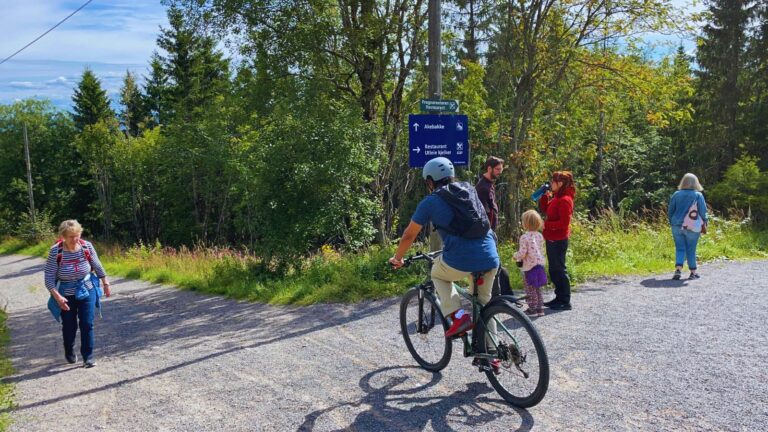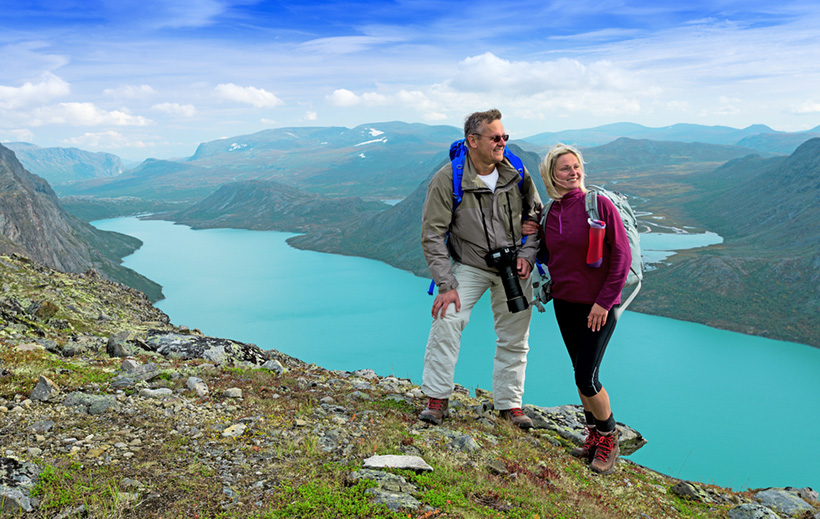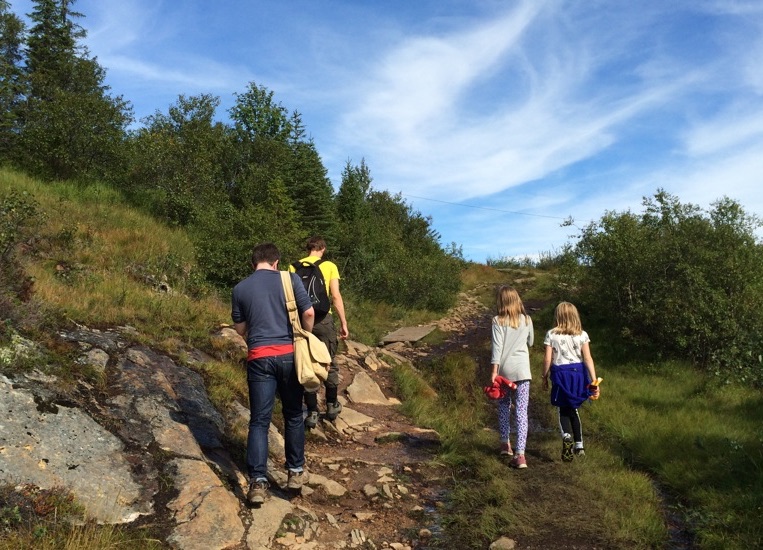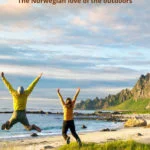Friluftsliv, the Norwegian philosophy of embracing the great outdoors, may hold the secret to integrating into Norway's society and unlocking happiness. Let's take a look at this cultural habit popular among seemingly all Norwegians.
When I first moved to Norway, one of the first things I noticed is how much Norwegians loved being outdoors. I didn't know the term for it at the time, but it was very clear to see.

This concept known as ‘friluftsliv' is crucial for newcomers aiming to assimilate and find happiness in Norway.
Unlike the globally popular Scandinavian trends of hygge/koselig and lagom, friluftsliv emphasizes the simplicity and richness of outdoor living as a pathway to well-being.
Now, let's explore how this deeply ingrained tradition, championed since the 19th century, continues to define Norwegian culture and personal fulfilment.
Table of Contents
The Key to Happiness in Norway?
While the Scandinavian ‘lifestyle craze' of hygge has taken the world by storm, the key to happiness in Norway is actually much more straightforward. Simply put: spend time outside.
The world friluftsliv is an amalgamation of the Norwegian words for free, air and life, and is best translated as an outdoors lifestyle.

After living here for more than 10 years, I'd suggest that not embracing this concept is one of the key reasons why some newcomers fail to fit in to a new life in Norway.
From City Girl to the Mountain Trails
Just like me, Lorelou Desjardins has spent more than ten years trying to understand Norwegian culture in public.
She writes openly on her blog and in the Norwegian media about her conversion from city girl to someone who has learned to love spending her weekends in nature.
During her recent TEDx Trondheim talk, she explained that although the term friluftsliv was first coined by Norwegian playwright Henrik Ibsen in 1859, it’s been part of Norwegian culture for hundreds of years.
“It’s quite amazing that reconnecting with nature and having an outdoor lifestyle is still part of the Norwegian soul despite this very modern lifestyle that Norwegians have today,” she said.
Living a Life Outdoors
She goes on to explain her take on friluftsliv as a philosophy of living a life outdoors:
“It’s about a simple life in nature without destroying or disturbing it. It has absolutely nothing to do with the commercialisation of friluftsliv recently on social media, with people lining up on top of Norwegian mountains to take pictures of themselves.”
Desjardins also explains that Friluftsliv doesn’t need to be as extreme as climbing glaciers. The Norwegian habit of spending time outside on Sundays is a great example.

“It can be something as simple as taking a Sunday hike with your family in the forest, going skiing with your friends on the weekend from cabin to cabin, or going ice fishing with your grandfather,” she said.
Keeping the Outdoors Accessible
Friluftsliv is enabled at least in part by the continued success of the Norwegian Trekking Association (DNT).
For 150 years, DNT has worked to promote hiking and to improve conditions for all who enjoy Norway’s broad range of outdoor attractions, come rain or shine.
Membership has grown from an initial 223 to more than 250,000. Many of those members volunteer to maintain the vast network of hiking and cross-country ski trails.
The organisation also owns around 550 cabins all around the country, many of which are unmanned. These cabins can be used by members as a place to rest or take shelter when out on a hike or a skiing trip.
If you want to get started with hiking in Norway, it's well worth checking out the DNT website and considering becoming a member.
Oslo: An Outdoors Capital
Despite this infrastructure, friluftsliv doesn’t have to involve heading out into the wilderness. There’s plenty of ways to embrace the lifestyle without leaving the country’s cities.
Here in Trondheim, I'm just minutes from a riverside trail, and a bus ride from the vast city forest. The same applies in the capital city, Oslo.

Curtis Rojak moved to Oslo with a pre-existing love of the outdoors life. He turned his hobby into a cycling tour business, Viking Biking, to show off the Norwegian capital to visitors.
I interviewed him last year for my podcast, the Life in Norway Show, where he explained: “we cycle around the city and walk along sea cliffs and through forest yet we’re basically still in the city. People are amazed by it.”
The accessibility of nature in Oslo is striking. The T-Bane metro system takes passengers into forests barely a 20 minute ride from downtown, while a public system of ferries shuttles people off to a handful of idyllic islands just minutes from the bustling Aker Brygge wharf.
Rojak says that to fully appreciate the core of friluftsliv, you have to live it: “When you visit as a tourist you can see there is amazing nature. But it’s when you’re living here and you see how it affects day to day life that it really hits home. You can see how it affects urban planning and education.”
Back in Trondheim
As I mentioned earlier, Trondheim is another Norwegian city with easy access to the outdoors.
Within ten minutes' walk from my house, I'm wandering along a riverside trail. Marked ‘urban hikes' have sprung up in recent years, encouraging you to walk that little bit further and possibly discover new areas.
Trondheim's city forest Bymarka is just a bus or tram ride away from the city centre. Here, marked trails disappear into the forest and emerge around lakes or onto clearings with spectacular views of the city far below.

Having spent years touring Norway, I am yet to find a town or city without such easy access to nature!
Learning Friluftsliv
When researching this article, one thing I didn't expect to find was formal education in frilutsliv. Yes, you really can study the topic in Norway.
Those with a passion to learn more can study various outdoor education, leadership, and outdoor studies courses at Norwegian higher education institutes across the country.
Yet education in friluftsliv starts much earlier than graduate school. The lifestyle is encouraged from a very young age, as Rojak explained.
“I have a three-year-old who skis as much as she can, and a six-year-old who wants to climb mountain peaks. Family vacations are often based around friluftsliv. It’s a concept that permeates every aspect of life in Norway,” he said.
Immigrants and Friluftsliv
Participation in this cherished cultural norm varies among immigrants. A report by Statistics Norway reveals that while outdoor activities are embraced by many, immigrants, particularly from outside the EU/EEA, show lower engagement rates.
Factors influencing this include socioeconomic status, income, education level, and gender.
This trend highlights the nuanced relationship between cultural integration and outdoor pursuits, underscoring the need for inclusive approaches to promote the health and well-being benefits of friluftsliv across diverse communities.
If you're still relatively new to Norway, give hiking a try. You may be surprised to discover that the locals have a completely different side to them when out on the trails!






I am interested in Rollag, Numedal, as my family came from there. I have not seen any articles on it, and wondered if it still exists, since it was so small. My family immigrated to America in 1896.
Found it, still there:
https://goo.gl/maps/qCjfztQ1HmtRpRRU9
Having been on many visits to Norway I agree absolutely that exploring the outdoors is the best way to see the country and meet and get to know Norwegians, especially on longer hikes. There’s nothing like sharing a cabin or a meal in a mountain hut to break the ice. My DNT key is a prized possession and has opened up the country so much !
This was an interesting article on FRILUFTSLIV and wonder if the information is from the book of the same name that I received at Christmas by Oliver Luke Delorie that I have enjojed very much? A synopsis of Connect with Nature the Norwegian Way. I have learned much from it relating to my feelings about nature. Must be in my Norwegian blood!!